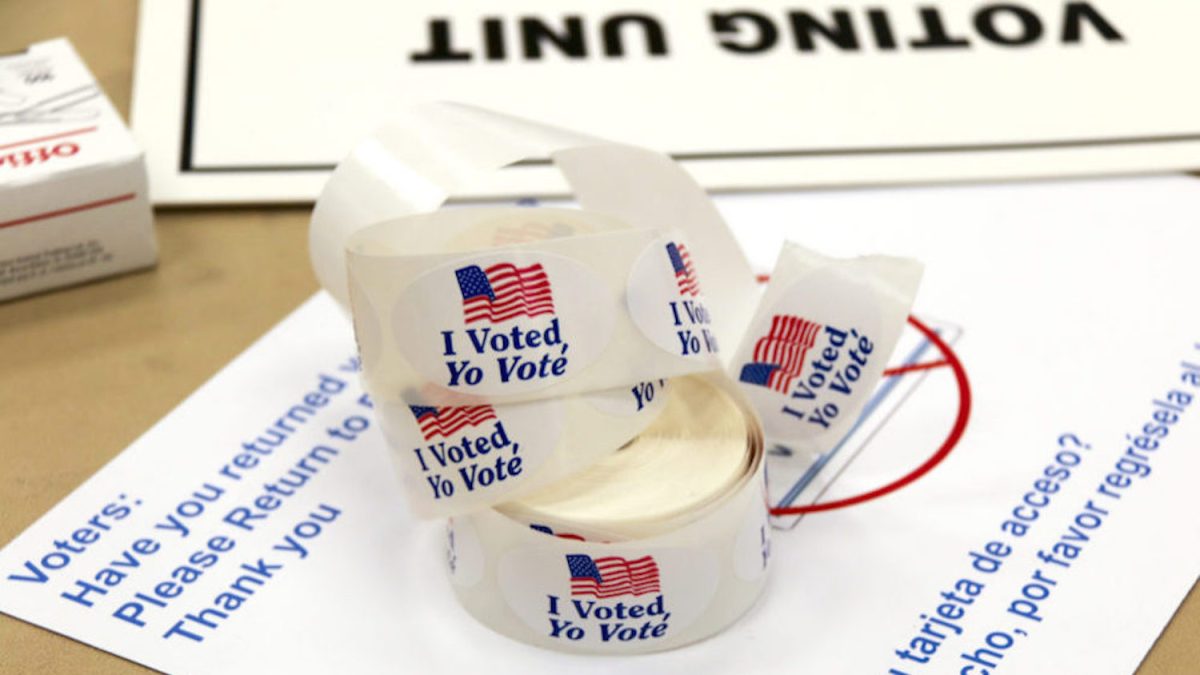For many Americans, this year’s presidential election was considered pivotal in regards to the state of democracy. With pressing issues such as the immigration crisis, abortion rights and the economy, voters were left to make a tough decision during this election. Although expected to be a closer race between Kamala Harris and Donald Trump, Trump won with 50.2% of the popular vote and 312 electoral votes. On election night, voters waited anxiously as every swing state including Pennsylvania, Michigan and Georgia turned red, solidifying Trump’s win.
The election lead-up:
One important reason why this election was so different from previous elections was Harris’s quick timeline, with the shortest presidential campaign in modern American history of 107 days, according to the New York Times. She also was not elected through a Ddemocratic primary. “I would have liked a primary, but I mean, I still like her as a candidate,” said senior Sarah Peterson. “I thought she was a better choice than some of the people that [the Ddemocratic party] had been floating around.”
However, some voters were frustrated by the lack of primaries and her continuation of policies from the Biden administration. “I just didn’t like Kamala to begin with because she wasn’t really the people’s choice. I feel like she was kind of just put there as a placeholder when Biden dropped out because he’s too old,” said senior Evan Hall.
Trump also faced accusationsissues on the road to becoming the 47th president, including accusations regarding him being a threat to democracy. Primarily, these accusations were due to the unrest fromcaused by the Jan. 6 attacks on the nation’s capital by Trump supporters in 2021. Left-wing news sources and Harris supporters held Trump responsible for the attacks while right-wing organizations and Trump supporters downplayed the attacks or denied Trump’s involvement.
Furthermore, some students are alarmed by Trump’s conservative rhetoric and his campaign promises. “I don’t think that a lot of the rights I have now I’m still gonna have [after] this presidency. I think that I will be majorly affected in a negative way, being a person of color and also being female. I fear for my safety a little bit,” said junior Alyssa Gatunbo.
Many voters felt they had to pick between the ‘lesser of two evils’ this election, not satisfied with what the Democratic party was offering, yet unwilling to vote for Trump. “I’d rather vote for someone who at least will try to compromise and try to inch things forward bit by bit, rather than going back to four years of Trump,” said senior Thomas Baker-Trinity.
However, many women supported Harris’s policies on abortion and voted to keep their reproductive rights. “[Harris] talks a lot about being pro choice and giving people the right to choose over their own bodies – bodily autonomy,” said Peterson. “That’s something that I really supported, and I thought was a good policy, and actually the majority of Americans also agree with her view on that.” According to Gallup, 54% of Americans identify as pro-choice.
Path to Trump’s victory:
Trump’s win can be attributed to several reasons, primarily his economic plans which resonated with Americans across socio-economic classes. “I think gas is going to be cheaper and taxes are going to be less as well,” said junior Anthony Kurilov. Trump has promised to impose tariffs as high as 60% on Chinese imports, which his voters see as him protecting jobs and industries from foreign competition.
On the other hand, some are skeptical of these policies. In one report by BBC, Trump’s tariffs are projected to hurt the US economy, increase the national debt and fail to make an impact on American jobs. “Most people aren’t going to look into the actual policies. They’re going to see the [US economy while Biden was president] was bad. It wasn’t his fault. But they’re going to say, ‘Oh, the economy under Biden was bad, Trump can fix it,’” said senior Thomas Baker-Trinity.
Many believe that Harris ’s problem was that she had trouble getting her economic policies out to the public, even after being endorsed by 23 Nobel Prize winning economists according to Fortune. “It was a little bit of a misconception that she didn’t really have an economic policy cause on her website there was, like, a hundred page economic [policy document],” said Peterson.
Furthermore, by the time Harris had become the Democratic Party’s presidential candidate, approval ratings for her had been at an all-time low since the beginning of her vice presidency. Though her favorability rating had noticeably increased afterwards, this was not enough to help her win the election.
Trump, however, knows how to market himself, by appealing to voters on social media and through more creative methods like podcasts. His podcast episode on the Joe Rogan Show reached over 50 million views on YouTube. He presents himself as a candidate different from ‘typical’ politicians, appealing to voters who are tired of false promises and political gridlockthe never-changing nature of American politics. “[Harris] just wasn’t selling it as passionately as Trump, and then people would see, Trump’s out here, he’s selling it, he’s really fighting for these policies. Then she’d be kind of working around the policy questions, instead of just attacking it and because people can’t buy if you’re not selling, you know? And I feel like he just did a better job of selling,” said senior Joe Cole.
Compared to the last election, Trump gained the support of demographics that voted for Biden in 2020 and were expected to sway in Harris’s favor. In 2020, 63% of Latino voters voted Biden, while only 55% chose Harris this election. The Latino vote was crucial, especially in swing states like Nevada, Arizona and Pennsylvania. Though Harris won Latino voters in a slim majority, the increase in those who voted for Trump allowed him to win. At a larger glance, support for Trump increased over all minority groups and in the white majority of men and women as well.
What the future holds:
Project 2025, a multi-pronged project to overhaul the executive branch, as described by CBS, plans to make immense changes in society such as severe abortion and immigration restrictions. While Trump denies even reading this plan, some Democrats are worried about Trump attempting to put the plan to use.
Trump’s winning of the election has some students worried about his time in office come January, especially with his stances on immigration and abortion. Trump has said he plans to conduct the “largest domestic deportation operation in American history” according to speeches he has made of an estimated 11 million people without authorization, using expedited removal processes. This could lead to economic instability, especially in sectors like agriculture and construction which are heavily dependent on undocumented immigrants according to Time Magazine.
The increasing polarization in politics, noticeably with the rhetoric of this election cycle has disheartened some students. “I’ve just been frustrated. Lots of people have been dealing with anger or violence and even vocally taking [it] out on other people because of the election, and that polarization is really unhealthy,” said senior Joe Cole. The recent remarks by Trump calling Harris a “s–t vice president” along with Biden’s insinuation of Trump supporters as garbage has shown an increasingly deep divide between Americans across the political spectrum.














![[DEBATES] Prestigious colleges: value or hype?](https://www.mvviewer.org/wp-content/uploads/2024/12/buildings-1200x654.png)































![[OPINION] The dark origins of TikTok's looksmaxxing trend](https://www.mvviewer.org/wp-content/uploads/2024/02/Copy-of-Copy-of-Untitled-Design-1200x675.png)












